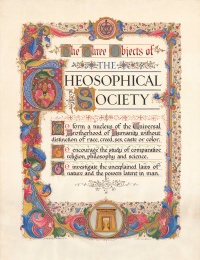The Three Objects (art work): Difference between revisions
(Created page with "'''UNDER CONSTRUCTION'''<br> '''UNDER CONSTRUCTION'''<br> right|200px|thumb|''The Three Objects'' '''''The Three Objects''''' is a work of ca...") |
No edit summary |
||
| (2 intermediate revisions by the same user not shown) | |||
| Line 1: | Line 1: | ||
[[File:Bondy_Three_Objects.jpg|right|200px|thumb|''The Three Objects'']] | [[File:Bondy_Three_Objects.jpg|right|200px|thumb|''The Three Objects'']] | ||
'''''The Three Objects''''' is a work of calligraphy by [[A. T. Bondy]] illuminating the [[Objects of the Theosophical Society]]. | '''''The Three Objects''''' is a work of calligraphy by [[A. T. Bondy]] illuminating the [[Objects of the Theosophical Society]]. Donated to the [[Theosophical Society in America]] by the artist in 1944, it hangs in a prominent location in the [[L. W. Rogers Building|headquarters building]]. | ||
== Wording == | |||
The wording of the piece is: | |||
::1. To form a nucleus of the Universal Brotherhood of Humanity, without distinction of race, creed, sex, caste or color.<br> | |||
::2. To encourage the study of comparative religion, philosophy and science.<br> | |||
::3. To investigate unexplained laws of Nature and the powers latent in man. | |||
This is the wording used by the [[Theosophical Society in America]] and its [[Theosophical Society (Adyar)|parent society]] based in Adyar, Chennai, India. | |||
For history of the objects and variations in other branches of the [[Theosophical Movement]], see '''[[Objects of the Theosophical Society]]'''. | |||
== History and technique of the art == | |||
Gerald Moscato, himself an expert in the art of illumination, wrote about the process Bondy used: | |||
<blockquote> | <blockquote> | ||
The piece took Bondy approximately five years to complete in conjunction with his full-time job at the Scriptorium Studio. The illuminating detail was first done in pencil on separate tracing paper. This procedure allowed him to dust charcoal on the tracing in order to transfer the drawing to the parchment where the ink and colors were meticulously applied. Small sections of the illuminating were done at a time until the entire piece was completed.<ref>Gerald Moscato, "Remembering The Past: A Profile of Andreas Theodore Bondy" website or blog posting. Date and URL unknown. ca. 2005-2006.</ref> | The piece took Bondy approximately five years to complete in conjunction with his full-time job at the Scriptorium Studio. The illuminating detail was first done in pencil on separate tracing paper. This procedure allowed him to dust charcoal on the tracing in order to transfer the drawing to the parchment where the ink and colors were meticulously applied. Small sections of the illuminating were done at a time until the entire piece was completed.<ref>Gerald Moscato, "Remembering The Past: A Profile of Andreas Theodore Bondy" website or blog posting. Date and URL unknown. ca. 2005-2006.</ref> | ||
Latest revision as of 16:07, 20 February 2023
The Three Objects is a work of calligraphy by A. T. Bondy illuminating the Objects of the Theosophical Society. Donated to the Theosophical Society in America by the artist in 1944, it hangs in a prominent location in the headquarters building.
Wording
The wording of the piece is:
- 1. To form a nucleus of the Universal Brotherhood of Humanity, without distinction of race, creed, sex, caste or color.
- 1. To form a nucleus of the Universal Brotherhood of Humanity, without distinction of race, creed, sex, caste or color.
- 2. To encourage the study of comparative religion, philosophy and science.
- 2. To encourage the study of comparative religion, philosophy and science.
- 3. To investigate unexplained laws of Nature and the powers latent in man.
This is the wording used by the Theosophical Society in America and its parent society based in Adyar, Chennai, India.
For history of the objects and variations in other branches of the Theosophical Movement, see Objects of the Theosophical Society.
History and technique of the art
Gerald Moscato, himself an expert in the art of illumination, wrote about the process Bondy used:
The piece took Bondy approximately five years to complete in conjunction with his full-time job at the Scriptorium Studio. The illuminating detail was first done in pencil on separate tracing paper. This procedure allowed him to dust charcoal on the tracing in order to transfer the drawing to the parchment where the ink and colors were meticulously applied. Small sections of the illuminating were done at a time until the entire piece was completed.[1]
Notes
- ↑ Gerald Moscato, "Remembering The Past: A Profile of Andreas Theodore Bondy" website or blog posting. Date and URL unknown. ca. 2005-2006.
